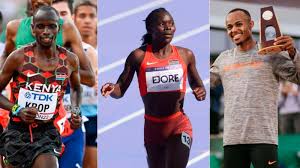
As the 2025 World Athletics Championships in Tokyo loom, Kenya’s athletics scene is buzzing with intensity—not only because of its local talent, but due to the rising presence of a formidable foreign legion eager to earn their place on Team Kenya.
These are athletes born outside of Kenya or with dual nationality, many of whom have naturalized, trained in elite global systems, and now stand shoulder to shoulder with Kenyan-born champions in domestic trials and qualification events.
For decades, Kenya has been an undisputed powerhouse in middle- and long-distance running. From Kip Keino to Eliud Kipchoge, the country has produced legends whose dominance has shaped global athletics. However, the dynamics are shifting slightly in 2025.
With increased globalization, access to elite training, and Kenya’s reputation as a high-performance hub, a growing group of athletes with Kenyan roots or affiliations—yet honed abroad—is eyeing selection to represent the nation on the grandest stage.
Among the standout figures in this foreign legion is 800m specialist Jason Kiprotich, born to Kenyan parents in the United States but raised and trained in Oregon. Having recently switched allegiance, Kiprotich shocked fans at the Kenyan national trials with a blistering 1:43.75, a time that would have ranked among the top five globally last season. His sprint finish and tactical savvy, acquired through years of NCAA competition, present a strong challenge to Kenya’s homegrown stars.
Another top contender is Naomi Wanjiru, a distance runner who has trained in the UK since she was a teenager. After earning Kenyan citizenship earlier this year, Wanjiru quickly made headlines by finishing second in the women’s 5000m at the national trials in Eldoret. Her presence has sparked debate—while some welcome the broadened pool of talent, others fear that foreign-trained athletes may push out locally developed runners.
Kenya’s Athletics Federation, for its part, has reiterated that the trials are open and merit-based. Federation president Jackson Tuwei noted, “We welcome any athlete who is eligible and meets our standards. Our focus is to send the strongest possible team to Tokyo.”
However, not everyone is in favor. Critics argue that these foreign-trained athletes, who often enjoy superior facilities and international exposure, may be at an unfair advantage over runners based in Iten, Kaptagat, or Ngong. They call for policies that protect the interests of grassroots athletes who have come through Kenya’s traditional highland training circuits.
Yet, the athletes themselves see it differently. “I’m Kenyan by blood, and I want to make my people proud,” said Kiprotich after his win in Nairobi. “This is not about where you train; it’s about heart, discipline, and performance.”
As Kenya prepares to finalize its squad for Tokyo, the blend of local icons and foreign-bred talents is shaping up to be one of the most competitive in recent memory. With world titles and national pride on the line, the inclusion of this formidable foreign legion adds a compelling narrative to Kenya’s enduring legacy in global athletics. The road to Tokyo is not just a race—it’s a reckoning of tradition, talent, and the evolving face o
f Kenyan sport.
Be the first to comment